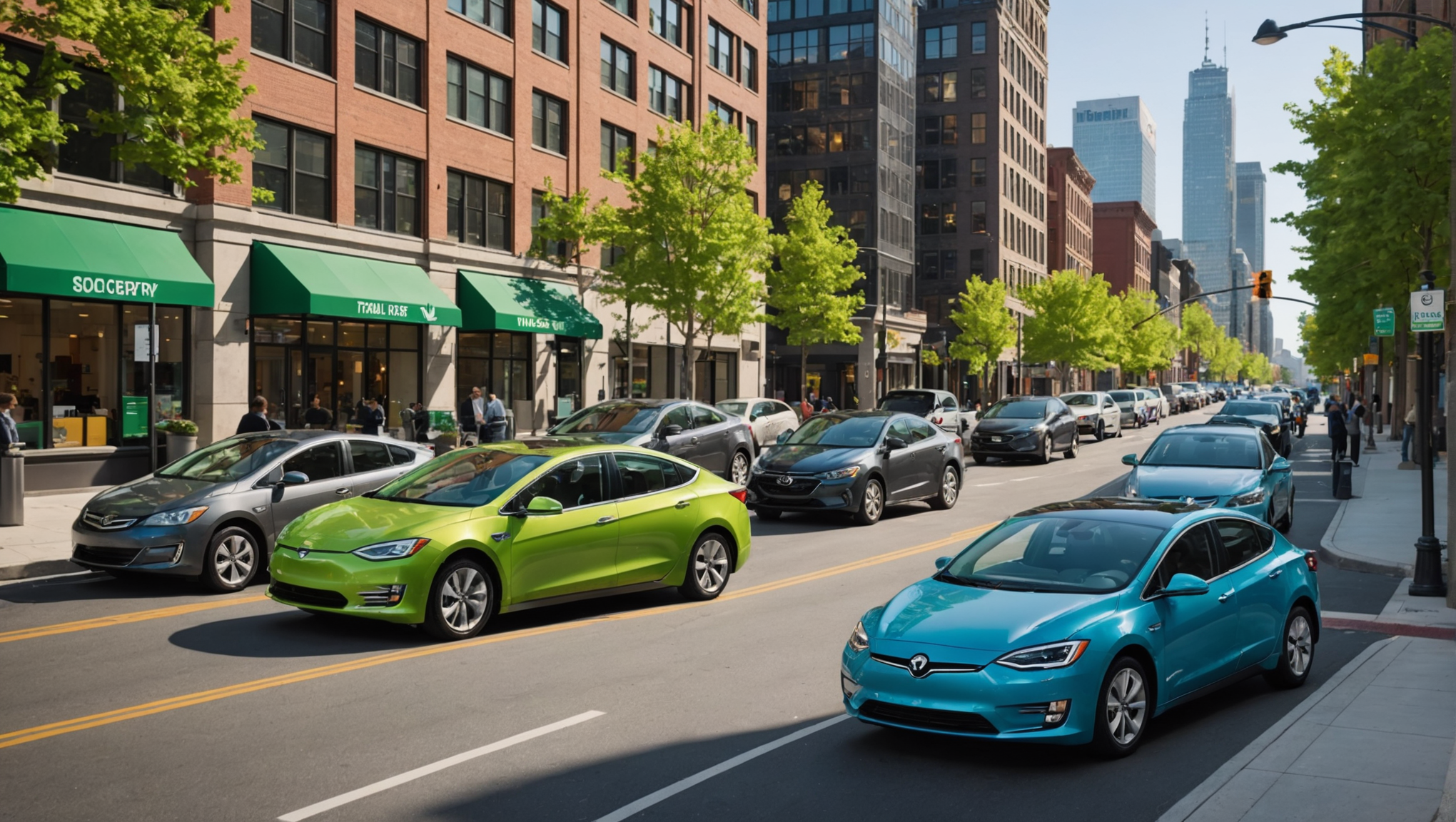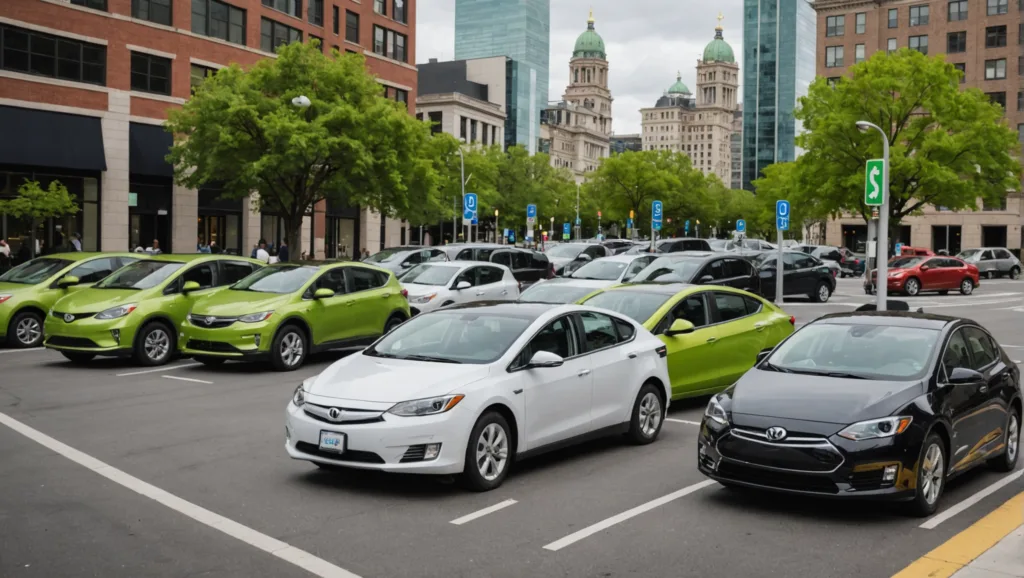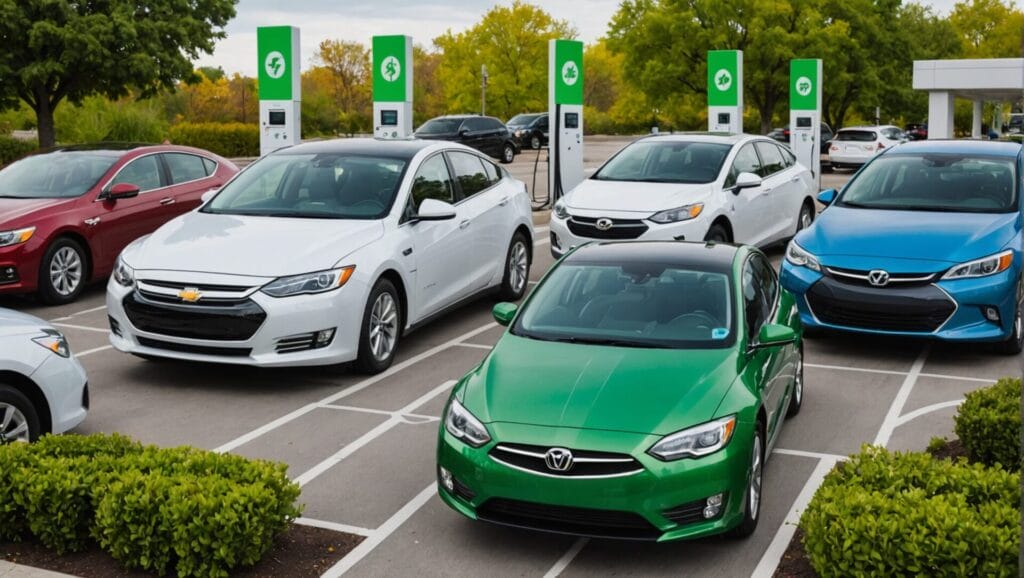Understanding EV Incentives: The Basics
Delving into the world of electric vehicles (EVs), prospective owners frequently have questions about the various incentives available to offset the initial cost of these futuristic vehicles. The primary incentive relating to EV ownership is the Federal Tax Credit, which applies to plug-in hybrid electric vehicles (PHEVs), battery electric vehicles (BEVs), and fuel cell electric vehicles (FCEVs) purchased in or after 2010. This program offers a credit amount of anywhere from $2,500 to $7,500 depending on the capacity of the vehicle’s battery. To claim the credit, vehicle owners must include the IRS form 8936 with their tax return. Importantly, the incentive is not a rebate and therefore does not deliver immediate funds. Instead, the EV tax credit is reflective of the year’s income tax and offsets the tax liability proportionately.
When considering a new EV, potential buyers must also be aware of the fact that tax credits are dependent on the vehicle type and the year the vehicle was purchased. In addition, these federal incentives only apply to new electric vehicles; used EVs and plug-in hybrids are not eligible. The full credit is only available to those who owe at least the same amount in federal income tax as the credit itself. The program is anticipated to expire in 2023, but until then all-electric vehicle and plug-in hybrid vehicle purchasers can benefit from this substantial incentive.

Other incentives include programs such as the Clean Vehicle Rebate Project, which offers rebates on a scaled system dependent on income. Furthermore, some states even offer additional incentives including excise tax exemptions, EV rebates, and credits for installing a Level 2 EV charger at home. It’s worth noting that leasing an EV also makes you eligible for the federal tax incentive, in which circumstance the credit typically goes to the dealer but is factored into the lease cost, reducing the amount due at signing.
Federal EV Tax Credit Explained
In aid of promoting green technology and sustainable energy, the U.S. federal government has introduced a tax incentive program to encourage the purchase of electric cars and plug-in hybrids. Officially termed as the Federal EV Tax Credit, this scheme provides substantial financial incentives for buying a plug-in electric vehicle. The vehicle tax credit, which applies to new vehicle purchases only, can range anywhere from $2,500 to $7,500 per vehicle depending on the capacity of the battery used to power the vehicle. This program encompasses both fully electric and hybrid vehicles, with the latter category generally eligible for lower credit amounts due to their smaller battery sizes.
The process of qualifying for these credits involves several important steps and criteria. Significantly, a vehicle must be a qualified plug-in electric drive motor vehicle and must be purchased for use or lease, not for resale. The vehicle must meet certain regulatory conditions to be considered a “qualified” EV. These include being an alternative fuel vehicle, such as a fuel cell vehicle, plug-in electric drive motor vehicle, and satisfying stipulations for battery capacity.
Additionally, the amount of credit that the new vehicle owner may expect is based on its battery capacity, further emphasizing the importance of the electric motor in the scheme. The vehicle purchase must also take place within the designated tax year to be eligible for a tax credit. Just as critical to mention is that the clean vehicle tax credit is only available as long as the manufacturer hasn’t exhausted their quota of qualified vehicles based on a per-vehicle and per-manufacturer cap.
How the EV Tax Credit is Calculated and How to Claim the Credit
Understanding the calculation of the Electric Vehicle (EV) tax credit along with the procedure on how to claim it is vital for potential purchasers or lessees of electric or hybrid vehicles. In essence, the tax credit for purchasing a qualifying electric vehicle, often referred to as the electric or hybrid vehicle credit, is determined based on the capacity of its electric drive motor. Not all vehicles are eligible for the tax credit, so it’s necessary to ensure the vehicle meets specific emission and efficiency standards. Those who purchase or lease an electric vehicle will find that the incentive for purchasing can result in significant savings.
Primarily, to be eligible for a federal tax credit under the clean vehicle credit program, the vehicle must be a plug-in electric drive vehicle or a hydrogen and electric automobile purchase. Some examples could include fully electric vehicles, hybrid and electric vehicles, or vehicles relying on a hydrogen fuel cell. If the vehicle is eligible, the credit may range from $2,500 to $7,500. However, this is not a refundable credit, meaning if the credit exceeds your tax liability, the excess is not returned to the purchaser. To claim the electricity vehicle tax, the IRS Form 8936 must be completed and appended to your tax return. You can generally credit the dealer for the amount of the credit at the time of vehicle purchase if permitted by the dealer.

Additionally, some states such as Connecticut, under their hydrogen and electric automobile purchase rebate program, or Baltimore through Baltimore Gas and Electric, offer further state-level tax incentives for electric vehicles. It’s also crucial to note that electric vehicle charging stations can sometimes be included in these benefits. However, remember that not all electric vehicles may qualify for tax credits. Review the IRS website or consult a tax professional to verify qualifications and more details about the electric drive motor vehicle credit.
EV Rebates, Incentives, and Purchase of New EVs in 2023
As we step into 2023, the landscape for Electric Vehicles (EVs) is gaining greater momentum with the introduction of robust incentives, rebates, and hefty advantages for new purchases. The emergence of the clean vehicle rebate program is among the many initiatives aimed at enhancing EV use. This reform is specifically engineered to offer financial windfalls to buyers who opt for eligible vehicles, thereby promoting an eco-friendly and sustainable approach to road travel. One of the crucial aspects here is the EV tax exemption – offering a significant reduction on duty costs associated with purchase and ownership, and thereby incentivizing a greater shift towards electric.
The Connecticut Hydrogen and Electric Automobile program has also been brought into effect to boost EV sales, demonstrating how specific states are fostering environmentally-conscious automobile programs. EV buyers are now eligible for a credit, the value of which is determined by the capacity of the EV’s battery, thus the more energy-efficient, the more credits received. Further sweeping the EV market are initiatives where electric vehicles are exempt from emissions testing, saving owners valuable time and money while aligning with clean-energy goals.
To synthesize:
- Financial incentives are offered through the Clean Vehicle Rebate Program
- Electric Vehicle Tax exemption reduces costs for EV buyers
- Connecticut Hydrogen and Electric Automobile program boosts state-specific EV sales
- Credit eligibility determined by the efficiency of the EV’s battery
- Exemption of EVs from emissions testing saves time and aligns with eco-friendly objectives
This expansive push towards cleaner, electric alternatives is coherent with the broader shift towards sustainability and the reduction of the global carbon footprint. Given these incentives and rebate programs, owning an electric vehicle in 2023 has never appeared more enticing.
Federal Incentive Options for Plug-in Hybrid and All-Electric Vehicles
The Federal Government offers a plethora of incentive options for plug-in hybrid and all-electric vehicles in an effort to augment the adoption of cleaner, more sustainable forms of transportation. One such opportunity is the electric vehicle tax credit – a federal income tax credit for the purchase of an eligible vehicle. The credit can be up to $7,500 depending on the capacity of the battery used to power the vehicle. On top of that, electric vehicles are exempt from some federal highway use taxes, which could result in substantial savings for owners. Moreover, many states supplement these offerings with additional incentives, including the Clean Vehicle Rebate Program in California, which provides rebates to buyers or lessees of qualifying vehicles.

Additionally, another incentive that has rampant appeal is that owners of eligible vehicles are often entitled to carpool lane access irrespective of the number of occupants. In Connecticut, the ‘Connecticut Hydrogen and Electric Automobile Purchase Rebate’ affords up to $5,000 to owners of plug-in hybrids and all-electric vehicles. This goes a long way in diminishing the acquisition cost, hence motivating potential buyers. Offering a blend of benefits, these incentives provide an undeniable boost to the ownership prospects of plug-in hybrid and all-electric vehicles, simultaneously contributing to the mission of reducing our collective carbon footprint.
Leasing a New EV: Exploring Federal Tax Credit & IRS Role
When considering leasing a new Electric Vehicle (EV), it is worth exploring the federal tax credit scheme and how the Internal Revenue Service (IRS) plays a pivotal role in its execution. Electric vehicles, due to their nature of being environmentally friendly, often qualify for federal and state tax credits as an incentive for buyers, thereby making them a financially attractive option. In this regard, eligible vehicles usually include battery electric vehicles (BEVs) and plug-in hybrid electric vehicles (PHEVs). The IRS oversees these credits, stipulating the qualifications necessary for a vehicle and an individual to be deemed eligible for a credit. The amount of credit you can claim varies depending on the capacity of the battery used to power the vehicle.
The clean vehicle rebate program is one such scheme that provides a tax credit for the purchase of EVs with the hopes of encouraging the adoption of greener transportation. Accordingly, electric vehicles are exempt from certain taxes, thus creating a financial benefit for the consumer. However, it is crucial to note that this tax credit applies at the time of purchase and not necessarily for leases. Some states also provide additional incentives; for instance, the Connecticut Hydrogen and Electric Automobile Purchase Rebate offers rebates for residents who purchase or lease a new eligible battery electric, fuel cell electric, or plug-in hybrid electric vehicle. Thus, it is wise for potential EV lessees to comprehensively research and understand the different incentive programs pertaining to their location for an informed decision.
Hybrid Electric Vehicle and Plug-in Hybrid Electric Vehicle: Eligibility for Federal Incentives
Hybrid Electric Vehicles (HEVs) and Plug-in Hybrid Electric Vehicles (PHEVs) are gaining substantial interest due to their potential contributions in reducing automobile emissions and improving fuel economy. Such vehicles are eligible for a variety of federal incentives intended to promote their adoption. A prominent example is the electric vehicle tax benefit, which offers tax credits to buyers of eligible vehicles. Other substantial incentives include the Clean Vehicle Rebate Program which awards purchasers and lessees with a rebate post the successful purchase or lease of a qualified vehicle. Furthermore, depending on the state, many electric vehicles are exempt from certain state taxes and inspection requirements, thus further sweetening the deal for potential buyers.
For instance, the Connecticut Hydrogen and Electric Automobile Purchase Rebate offers up to $5,000 in rebates for Connecticut residents who buy or lease a new eligible vehicle. This robust incentive program seeks to encourage the use of clean, alternative energy sources within the transport sector. Moreover, consumers who opt for either HEVs or PHEVs might also be eligible for a credit from the federal government – a remarkable financial incentive that can make these sustainable vehicles a more viable option for many. Utilization of these programs underscores the commitment of government entities to promoting an environmentally friendly, sustainable future.
Thus, as we transition towards clean energy adoption, it’s important to stay informed about the various incentives available. This not only includes the federal electric vehicle tax credits but also local and state incentives which may vary significantly. The incentives are designed to lower the cost barrier, making these eco-friendly vehicles more accessible to a wider range of consumers. Additionally, many of these programs have specific criteria and may be limited in duration or funding, so it’s crucial for interested buyers to research and take advantage of these incentives promptly. Overall, the combination of federal and state incentives for HEVs and PHEVs represents a significant push toward reducing carbon emissions and fostering a greener transportation sector.
Conclusion
In conclusion, several programs and incentives, such as the Clean Vehicle Rebate Program and electric vehicle tax, are encouraging the adoption of sustainable and energy-efficient transport means. Under the Clean Vehicle Rebate Program, an eligible vehicle that meets the defined criteria can be eligible for a credit or rebate which lowers the upfront purchase cost. Additionally, under the electric vehicle tax, electric vehicles are notably exempt, creating attractive financial incentives for potential consumers. Such benefits are not limited to electric vehicles alone but expand to other alternative fuel vehicles as well. For instance, in Connecticut, the adoption rate of alternative fuel vehicles is increasing thanks to the Connecticut Hydrogen and Electric Automobile program. This program specifically targets eligible vehicles running on hydrogen fuel cells or electricity. Overall, these incentives and programs are crucial in promoting the wider use of electric vehicles, thereby contributing significantly to environmental preservation efforts.
FAQ’s:
Q1. What vehicles are eligible for government incentives and rebates for electric and hybrid cars?
A1. Eligible vehicles for government incentives and rebates for electric and hybrid cars include electric vehicles, plug-in hybrid electric vehicles, and fuel-cell electric vehicles.
Q2. Are electric vehicles exempt from electric vehicle tax?
A2. Yes, electric vehicles are exempt from electric vehicle tax.
Q3. What is the Clean Vehicle Rebate Program?
A3. The Clean Vehicle Rebate Program is a state-funded program that provides rebates to Californians who purchase or lease eligible zero-emission and plug-in hybrid vehicles.
Q4. Are electric vehicles eligible for a credit?
A4. Yes, electric vehicles may be eligible for a federal tax credit of up to $7,500.
Q5. What is the Connecticut Hydrogen and Electric Automobile Purchase Rebate Program?
A5. The Connecticut Hydrogen and Electric Automobile Purchase Rebate Program provides rebates of up to $5,000 for the purchase or lease of eligible zero-emission and plug-in hybrid vehicles.

Aleksandra Kosanovic
Aleksandra Kosanovic is a dedicated advocate for sustainable living, committed to empowering individuals to make eco-conscious choices. With a background in environmental activism, Aleksandra shares practical tips and innovative solutions for a more sustainable lifestyle. Join her in the journey towards a planet-friendly future.


 The Evolution Of Electric Vehicle Batteries | Advances In Technology
The Evolution Of Electric Vehicle Batteries | Advances In Technology
